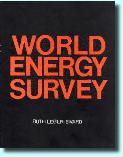Ruth Leger Sivard's |
||
 |
|
Home___Publications___Background___Contact |
|||
| |
||||||
World Energy Survey by Ruth Sivard |
||
Foreword by Edwin A. Deagle, Jr. The massive energy transition the world has been undergoing since 1973 continues to be full of surprises. Past predictions of energy independence based on a diversity of supplies; of the unlikelihood that conservation based on higher energy prices would be much help; of the prospect that OPEC countries would drive prices higher and higher have all proven wrong. Many people now interpret the current surplus in he oil market as evidence that the power of OPEC is broken and the energy crisis is essentially over. This prediction is undoubtedly wrong too. |
||
What is true is that energy will remain high on the policy agenda of most countries for a decade and probably longer. New sources of supply require vast sums of capital and long periods of time to bring to the market. The promise of renewable sources of energy at reasonable prices remains in the future. conservation in reaction to high energy prices has been the most successful public response to the energy transition to date, greatly overshadowing the efforts of governments. Nevertheless, governments and international agencies have begun to act. We note that the United Nations is holding a Conference on New and Renewable Sources of Energy at Nairobi, in August 1981. It is the first international efort in some time to attempt to fashion strategies for international action; and we hope that it will be successful. In thebelief that informed public opinion is both the prerequisite and the guarantee of effective public policy, The Rockefeller Foundationn is pleased to support the work of Ruth Sivard in preparing this volume. Revised and expanded from an earlier version published in 1979, the volume is intended to provide an overview of the world energy situation and prospects for the future. Its merit, in our judgement, lies in the useful way it marshals complex facts and issues for the lay reader. The foundation takes no formal positions on matters of public policy and therefore does not, by its sponsorship, necessarily endorse the substantive views expressed in this report. We are pleased, howerver, to support this useful work with the hope that it will contribute greatly to public understanding of these complex and vexing issues. Edwin A. Deagle, Jr., Ph.D. |
||
